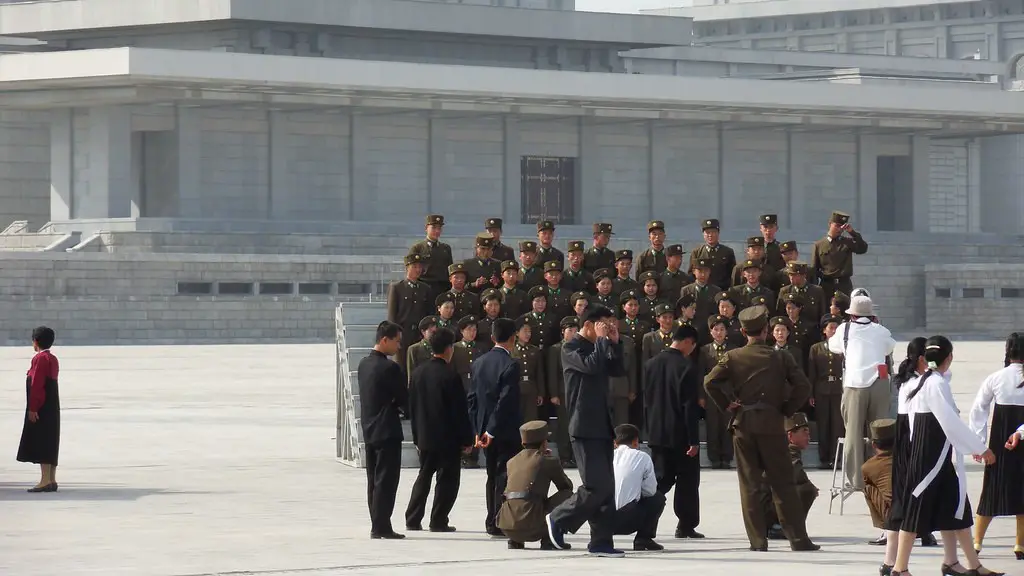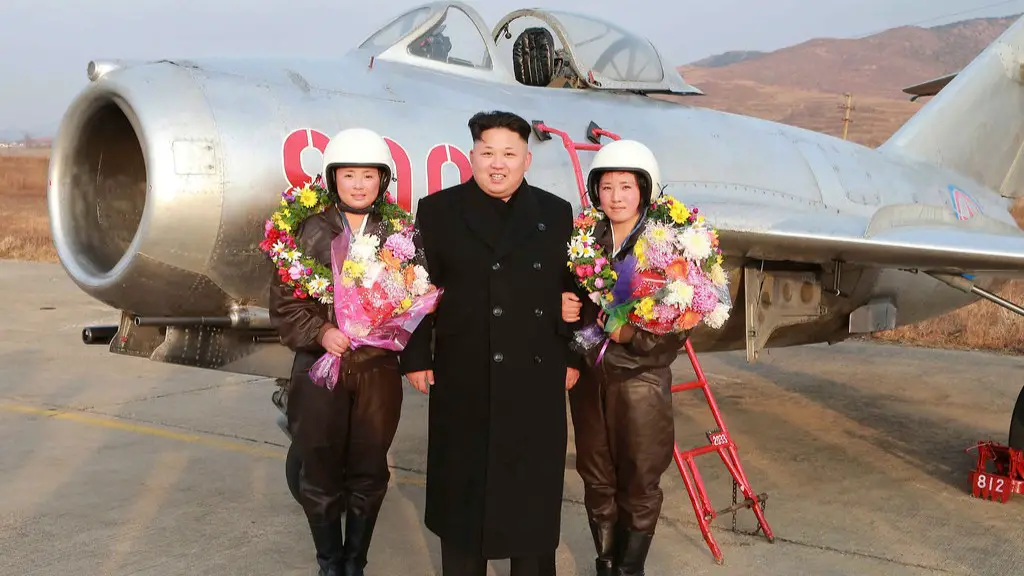Background
North Korea is a tightly-controlled, one-party communist state located in East Asia. A major regional power, it has had its own nuclear weapons program since the mid-1980s, and its history of provocative actions and refusal to abandon its nuclear ambitions has raised major international security concerns. The current state of affairs between North Korea and the United States remain tense, with several US-led UN economic sanctions in place in an effort to persuade North Korea to give up its nuclear weapons program.
Given the current situation, the question of whether or not bombing North Korea is a viable solution to the problem arises. On the surface, this appears to be a straightforward solution – eliminating North Korea’s nuclear capabilities – but it is far from simple. There are many risks and complications associated with bombing North Korea, making it a controversial idea among experts.
Risk to Civilians
One of the biggest risks of bombing North Korea would be the potential for significant civilian casualties. If the US were to bomb North Korea, it would inevitably result in the deaths of innocent people. Despite US efforts to avoid civilian casualties, it is difficult to guarantee that no civilian casualties would result from a military strike. Furthermore, given the degree of control and secrecy of the North Korean government, it is impossible to anticipate the full extent of the potential civilian casualties before any military action is taken.
Risk of Retaliation
Another major risk of bombing North Korea is the potential for North Korea to retaliate with its own military action. North Korea has made it clear that it is willing to use military force to respond to perceived threats. Moreover, North Korea’s nuclear weapons program may give it the capability to launch strikes far beyond its borders, posing a potential threat to its neighbors or even further afield. In light of this, launching a military attack on North Korea could potentially result in the escalation of military hostilities and the risk of a full-scale military conflict.
Strategic Consequences
Bombing North Korea could also have major strategic consequences for the US and its allies. The US has invested heavily in maintaining diplomatic ties with China and other regional powers in order to maintain its influence in the region. An attack on North Korea could disrupt these ties, potentially weakening US influence in the region and emboldening other powers to challenge US interests.
In addition, an attack on North Korea could further damage US-North Korea relations and disrupt ongoing diplomatic efforts to persuade North Korea to abandon its nuclear program. A bombing campaign would send a powerful message, but it could also potentially weaken the US’s negotiating position and, ultimately, its ability to force North Korea to comply with international demands.
Political Ramifications
The political implications of bombing North Korea should also be taken into account. An attack on North Korea would not just be an attack on the North Korean government – it would also be an attack on the North Korean people. As a result, North Korea could potentially view an attack as an act of aggression, which could further exacerbate the conflict between the US and North Korea. It could also potentially galvanize North Koreans against the US and lead to a surge of support for the North Korean government.
Moreover, an attack on North Korea would likely be highly controversial on the international stage. US allies, in particular, would likely view a US attack on North Korea as an act of aggression. This could potentially strain US relations with its allies and even lead to the US being isolated on the global stage.
Economic Considerations
Finally, bombing North Korea would also have economic implications that should not be ignored. The expense of a military campaign against North Korea would be considerable, likely requiring a significant military budget. Moreover, an attack on North Korea could lead to a massive influx of refugees or even a full-scale evacuation of North Korean citizens. As such, this could be highly costly, both financially and in terms of the human cost.
In addition, a military campaign could lead to economic disruption in North Korea, potentially leading to increased poverty or even a humanitarian crisis in the country. All of these factors need to be taken into account when considering the risks and benefits of bombing North Korea.
Effect on Surrounding Countries
If the US were to bomb North Korea, it would have a devastating effect on the countries in the region, both economically and politically. The economic disruption resulting from a military campaign could potentially lead to a domino effect of economic decline in the neighboring countries as well. In addition, a possible outbreak of war between the US and North Korea could also lead to a surge of refugees from North Korea, who would need to be supported by nearby countries.
Furthermore, the political fallout from an attack on North Korea would likely be far-reaching. Regional powers such as China and South Korea could potentially view US aggression towards North Korea as a direct threat to their security and interests and could respond to the situation with their own measures.
International Relations Impact
Bombing North Korea would also have a major impact on international relations, with potential implications for peace and stability in the region. An attack on North Korea could potentially lead to further escalation between the US and North Korea as well as heightened tensions between regional powers, undermining global efforts to maintain peace and stability in the region.
Moreover, an attack on North Korea could damage US relations with its allies, who may view any US military action against North Korea as an act of aggression. This could lead to a breakdown of international cooperation and could potentially lead to a period of heightened global tensions.
Environmental Impact
Finally, the environmental impact of bombing North Korea should also be taken into account. A military campaign against North Korea could potentially cause significant environmental disruption, with the potential for contamination of air, water, and soil. Moreover, the environmental damage could also have a long-term impact, with the potential for lasting effects on human health and the environment.
Therefore, any decision to bomb North Korea should include an assessment of the potential environmental impact of the action. The US should also take steps to minimize this impact, as well as consider how it can mitigate any long-term effects in the region.
Economic Impact on US
A military campaign against North Korea could also have a significant economic impact on the US and its allies, in particular if the US were to bear the bulk of the financial burden for launching the attack. Military campaigns are highly expensive and require a significant amount of resources and manpower. As such, any military action against North Korea could put a strain on US resources and could potentially lead to increased military spending.
Furthermore, launching a military campaign against North Korea could also potentially destabilize global financial markets and could cause major disruptions to global trade. The US and its allies should therefore consider the potential economic impact of any military action against North Korea before making a final decision.
International Response
Any decision to bomb North Korea would likely be met with widespread international condemnation. The US and its allies have invested heavily in maintaining diplomatic relations with North Korea and other regional powers in an effort to resolve the conflict peacefully. As such, an attack on North Korea would undermine these diplomatic efforts and could result in a breakdown in relations between the US and its allies.
Moreover, an attack on North Korea could potentially lead to a wave of international criticism and protests from other regional powers and organizations, such as the UN. The US and its allies should therefore take into account the potential for a wave of international backlash before deciding on any military action against North Korea.
Conclusion
In conclusion, bombing North Korea is a complex issue with many potential risks and consequences. There are numerous risks associated with bombing North Korea, including potential civilian casualties and the risk of retaliation. In addition, launching a military campaign could have strategic, political, economic, and environmental consequences that must be taken into account. Finally, any decision to bomb North Korea would likely be met with widespread international condemnation and could potentially lead to a breakdown in diplomatic efforts to resolve the conflict peacefully.



